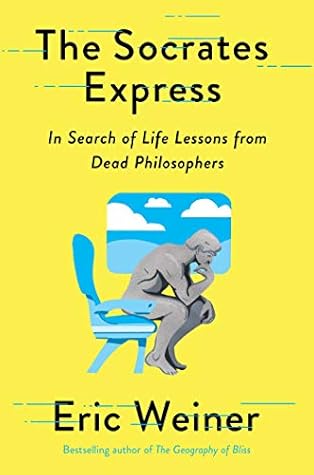More on this book
Community
Kindle Notes & Highlights
by
Eric Weiner
Read between
April 27 - May 30, 2022
4: Stay Curious
Old age is a time to reconnect with curiosity or, better yet, wonder. What is a philosopher, after all, but a seven-year-old with a bigger brain?
“None are so old as those who have outlived enthusiasm,” Thoreau said.
She subscribed to the playwright Eugène Ionesco’s formula: two days in a new country are worth thirty in familiar surroundings.
5: Pursue Projects
Have projects, not pastimes. Projects provide meaning.
This is one of the advantages of old age: you have more to give and less to lose.
6: Be a Poet of Habit
7: Do Nothing
8: Embrace the Absurdity
Old age isn’t life’s parody. Life is life’s parody. Old age is simply the punch line.
9: Disengage Constructively
It is not apathy, a turning away from the world. It is a gentle stepping back.
10: Pass the Torch
The person who departs this world with no unfinished business hasn’t lived fully.
Death makes philosophers of us all. Even the least contemplative person wonders at some point: What happens when we die? Is death really something to fear? How can I come to terms with it? Death is philosophy’s true test.
Montaigne puts it: “All the wisdom and reasoning in the world boils down finally to this point: to teach us not to be afraid to die.”
Montaigne
“It is not death; it is dying that alarms me,”
the odds of a human being dying are precisely 100 percent, with a margin of error of zero.
We can fool the world, we outgoing introverts, but at a personal cost. All this feigned extroverting drains us. Exhausts us.
Among the ancient sayings is one of Montaigne’s own: Que sais-je: “What do I know?” These four words neatly sum up his philosophy, and his way of life.
We don’t die because we are sick. We die because we are alive.
Death is not life’s failure but its natural outcome.
“If you
do not know how to die, don’t worry; Nature will tell you what to do on the spot, fully and adequately. She will do the job perfectly for you; don’t bother your head about it.”
Montaigne would not approve. It’s not the palliative care that would distress him but the denial. Technology distances us from the reality of death, which is nothing more and nothing less than nature. Since we are part of nature, we are only distancing ourselves from ourselves. Fleeing ourselves. One beep at a time. He’d look at the flashing monitors and the pinging cardiograph and the metered IV drips and see clear as day what was missing from the room: acceptance.
The remedy for death is not more life—any more than the remedy for despair is hope. Both states call for the same medicine: acceptance.
Driving our dread of death is not only fear but greed. We want more days, more years, and when, against all odds, we receive those, we want more still. Why? wondered Montaigne. If you have lived one day, you have lived them all.
Montaigne’s philosophy boils down to this: Trust yourself. Trust your experiences. Trust your doubts, too. Let them guide you through life, and to the threshold of death. Cultivate the capacity to be surprised, by others and by yourself. Tickle yourself. Remain open to the possibility of possibility. And, for God’s sake, says Montaigne, joining hands with his compatriot Simone Weil, pay attention.
From the Greek philosopher Sextus Empiricus: “It is possible and it is not possible.”
Familiarity doesn’t breed contempt. It breeds numbness. We fail to see the beauty of the proximate, or hear the music of home.


